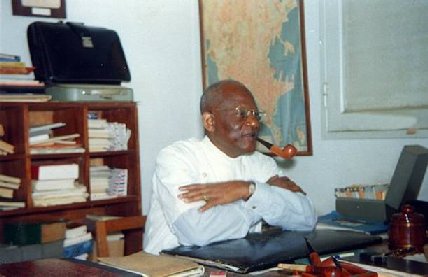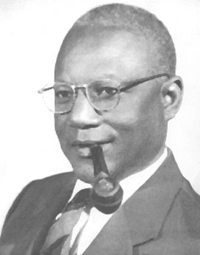|
Craig White's authors |
 |
Birago Diop (1906-89) |
 |
Senegalese poet and story-teller, a
prominent African francophone writer, who recorded traditional oral folktales of
the Wolof people. Birago Diop's work helped to reestablish general interest in
the African folktales published in European languages. 'Souffles', perhaps his
most famous poem, is considered the "poetic exegesis of animism" within the
Negritude movement (Wole Soyinka,The Burden of
Memory, the Muse of Forgiveness, 1999).
In his childhood
he heard stories told by his family's griot, which he later used in his own
literary work. Moreover, his two older brothers, Massyla and Youssoupha,
encouraged from early on his scholarly and literary pursuits. Diop attended a
Koranic school and in 1921 he moved to
In Paris Diop met
many African, Black American, and
'Souffles' (Breaths / Spirits / Forefathers), with the theme of unity of all things—living and dead—with nature, became one of the most anthologized poems of the movement: "Listen more often to things rather than beings. / Hear the fire's voice, / Hear the voice o water. / In the wind hear the sobbing of the trees, / It is our forefathers breathing." (in 'Forefathers', An African Treasury, selected by Langston Hughes, 1960)
Diop graduated in 1933 and after
completing his studies, he left
Diop returned to West Africa to inspect
cattle and treat sick animals in French Sudan,
While working in the colonial service
and traveling in the rural areas by canoe, horseback, car and foot, Diop
encountered bush people and learned of the Wolof traditions and oral literature.
The most important contact for him was the 60-year-old
griot Amadou Koumba Ngom, a professional storyteller
and oral historian, whom Diop met in the late 1930s. His tales Diop incorporated
in the award-winning Les Contes d'Amadou Koumba (1947), Les nouveaux
Contes d'Amadou Koumba (1958), which included an
essay by Senghor, and Contes et lavanes
(1963), which contained new material,
Wolof riddles, and aphorisms. (The Wolof is the most prevalent indigenous
language spoken in
http://kirjasto.sci.fi/bdiop.htm
